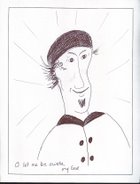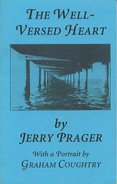In the heresies of daily reflections recorded
the word turns to note the way the mind
dissociates from custom, and plays infidel
while casting bread upon waters,
the quick tongue and the casual glance
and the falling light
of the skin sweet breath held in camera sight
beckon, like temptation understood,
for all paths are as narrow as the foot takes
to cross and uncross the sacred and the profane,
the desire and the yearning pale before the contention
of the final lust, piety insistent, denied,
refuted, held off, while the possibility of sense,
hair and voice and taste and smell and feeling
conspire to stray the line where gray shadow
merges with dark urge and cannot comprehend
the way the light slips cracks to find
the soul untangling from spirit
like bodies caught undressing
in a half open door by
a lover betrayed,
forgiving,
knowing too much
to do anything else
but remain the truth
when the words cannot even begin
to say what became of the life
we meant to live before we turned away.
In the blood and the loins and the lips
and the fire in the belly and
in the flash of freed thought,
new felt certainties
and perplexed nuances conceive
the heresy of experience
while debating innocence
with the willing and
the unwilling alike.
Old blog revisited
rather be here talking to myself than on social media as the insanity of the dying earth and killing fields are allowed to grow.
D'Etre Raisins
No sour grapes these,
rather the withered sweetnessof seasons lengthened
to aged fruition
chewed introspectively.
Wednesday, May 23, 2007
Subscribe to:
Post Comments (Atom)




2 comments:
Maybe I am more of a heretic than I thought. It was always a fiction. But this poem especially sings to me, capturing so many shifting emotions even though the action or language (I'm so ignorant about poetry) adheres more strictly to the intellect that some of your work-poems. Does that make sense? It affected me, though, and seems to be hanging around in my mind.
It's full of stolen images, the idea of piety being the final lust comes via Martin Buber, the Jewish theologian, it's a Hasidic conception, as for
the shifting of emotion within a theological argument, their mind -stickiness is probably achieved by the langour of the heresies listed, the biblical link been faithfulness and faith/fidelity and infidelity, the freed thought and the freed feeling straining to free themselves from responsibility.
Or something like that.
Post a Comment